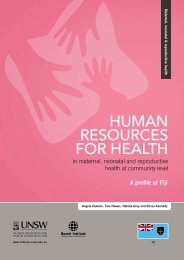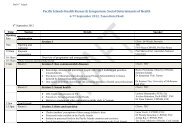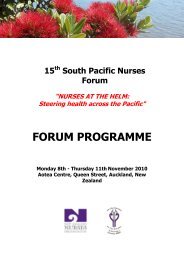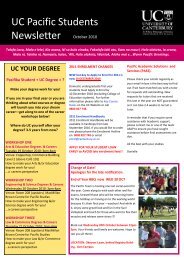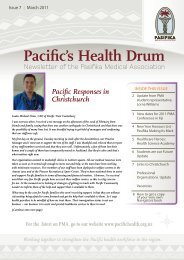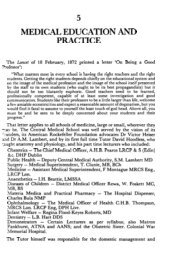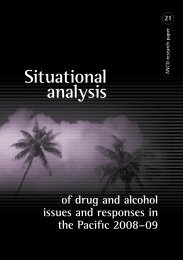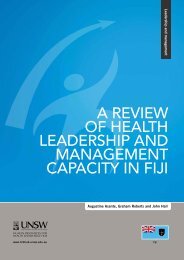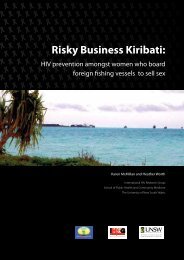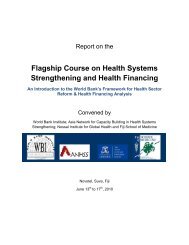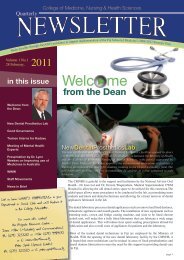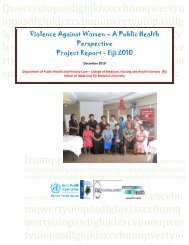rp21 situational analysis - Pacific Health Voices
rp21 situational analysis - Pacific Health Voices
rp21 situational analysis - Pacific Health Voices
You also want an ePaper? Increase the reach of your titles
YUMPU automatically turns print PDFs into web optimized ePapers that Google loves.
Situational <strong>analysis</strong> of drug and alcohol issues and responses in the <strong>Pacific</strong><br />
126<br />
for every two years. 608 In 2005 the provincial<br />
administration in Lae identified illicit trade<br />
as an issue, undertaking a ‘clean-a-thon’ to<br />
eradicate public consumption of illicit drugs<br />
and alcohol. 609 Despite the reported troubles,<br />
in the period from 1999 to 2004 there were<br />
an estimated 307 arrests by the Drugs and<br />
Vice Squad for drug-related offences, with<br />
60 per cent of offenders convicted in court,<br />
23 per cent absconding while on bail, 10 per<br />
cent dismissed for lack of evidence, and the<br />
balance placed on good behaviour bonds. 610<br />
Failed attempts at enforcement around illicit<br />
drug trafficking and use, and failure to enforce<br />
current legislation for alcohol-related<br />
offences (as identified at the PDARN meetings<br />
in 2008 and 2009), suggest the need to<br />
reconsider cuurent approaches to drug and<br />
alcohol policy in PNG. There is a clear argument<br />
for the development of a framework<br />
for a multi-sectoral response.<br />
<strong>Health</strong><br />
The PDARN delegate reports that mental<br />
health services are largely responsible for<br />
addressing substance use issues with the<br />
support of non-government organisations<br />
and church groups. Newspaper and radio<br />
programs are also used as a vehicle to undertake<br />
mass audience awareness-raising activities.<br />
The legal drinking age in PNG is 18<br />
years. 611 In December 2008, the Papua New<br />
Guinea Government announced a complete<br />
ban on the sale of betel nuts in plastic bags<br />
to commence early in 2009. While the ban<br />
appeared to be motivated by environmental<br />
concerns, 612 a later report suggested up to<br />
2000 people die yearly from health problems<br />
associated with chewing betel nut. 613 These<br />
included cancers, ulcers and tuberculosis.<br />
The most recent Census was undertaken by<br />
the National Statistics Office in 2000, with<br />
data collected once a decade since 1971. A<br />
simplified format suggests that no behavioural<br />
questions are asked. 614<br />
608 PNG security chief says intelligence in ‘shambles’, Papua New Guinea Post-Courier, 2 October<br />
2003. Available at: (accessed<br />
January 2009).<br />
609 Illicit drug trade rampant in Lae, <strong>Pacific</strong> Islands Broadcasting Association, 8 November 2005.<br />
Available at: <br />
(accessed January 2009).<br />
610 2nd PDARN meeting, July 2006.<br />
611 International Center for Alcohol Policies, Minimum Age Limits Worldwide: table available at:<br />
(accessed April 2009).<br />
612 Betel nut ban in Port Moresby delayed a month. Radio New Zealand International, 30 December<br />
2008. Available at: (accessed<br />
December 2008).<br />
613 Betel nut chewing deadly in Papua New Guinea. Papua New Guinea Post-Courier, 11 February<br />
2009. Available at: (accessed February 2009); see also .<br />
614 Papua New Guinea Census results are published by the Secretariat of the <strong>Pacific</strong> Community,<br />
available at: (accessed<br />
May 2009).



